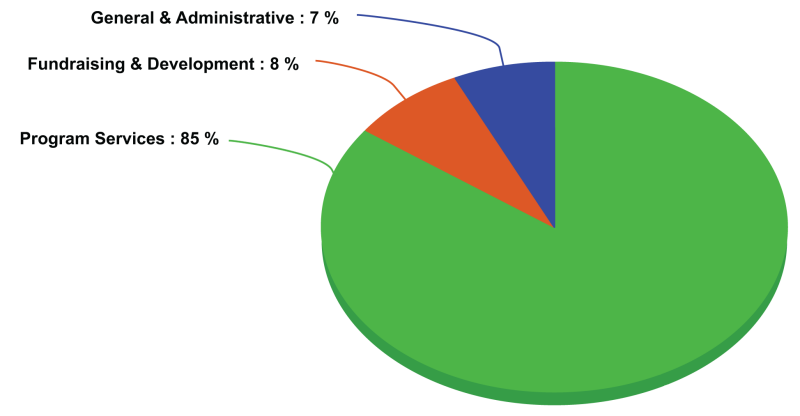
Welcome to Planet Aid's 2016 Annual Report! To help reduce waste and protect the environment, our annual reports are now available online.

Table of Contents:
- Letter from the President
- Results Overview
- Projects
- Planet Aid at Home
- People at Planet Aid
- Financial Statement
Letter from the President
Development in a Changing Climate
In 2016, Sub-Saharan Africa endured some of the most damaging weather in more than a century. Severe drought, preceded by destructive flooding, took the lives of many people, displaced hundreds of thousands from their homes, decimated food production, and created widespread hunger.
This terrible tragedy shows us that not only is climate change very real, but that it is impacting communities the most who have the very least. Planet Aid and its partners stand with the people of Malawi, Mozambique, Zimbabwe, South Africa and other affected countries and will work to regain lost momentum.
For nearly two decades, Planet Aid–supported programs have built and staffed schools and colleges, trained countless numbers of teachers, mobilized communities to stop the spread of epidemic diseases, fostered sustainable agriculture to strengthen food security, planted a multitude of trees, and much more. We have stayed true to our mission to inform, mobilize, and inspire individuals and communities to work together to bring about worldwide environmental and social change.
Our success would not be possible without the help of the many supporters and partners. In 2016, our hard-working staff collected nearly 95 million pounds of clothing and other items from our bins and at donation centers. This quantity helped save materials from disposal, relieved landfill burdens, and reduced greenhouse gas emissions by extending the life of these reusable items.
The funds generated from the sale of these collected items, in turn, not only helps to keep our collection work running, but supports all the vital development work that I mentioned above. You can read more about our work on the projects page of this annual report.
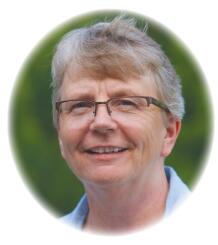
Thank you again for your support and we look forward to a productive year ahead.
Ester Neltrup, President
2016 in Review
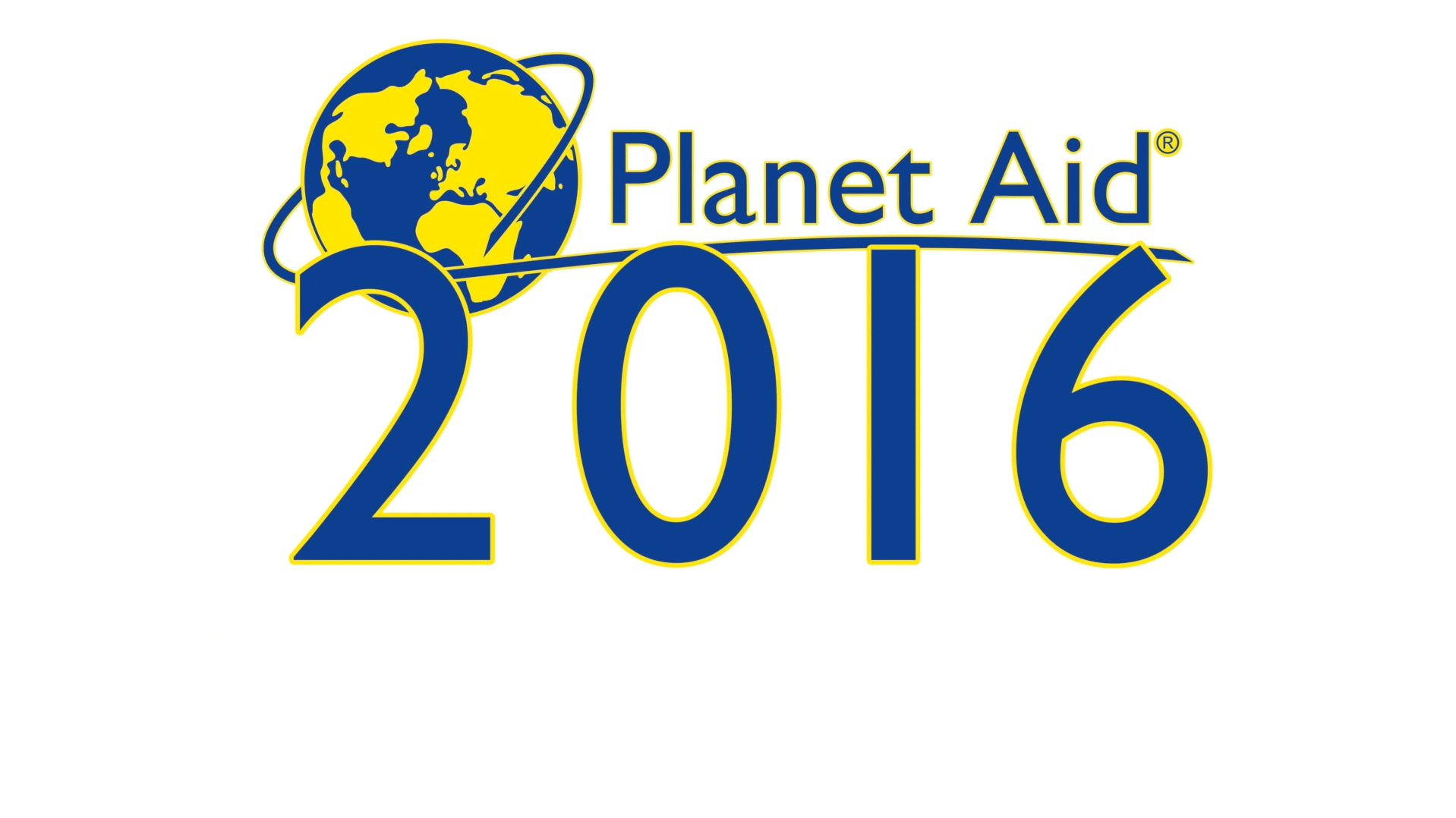
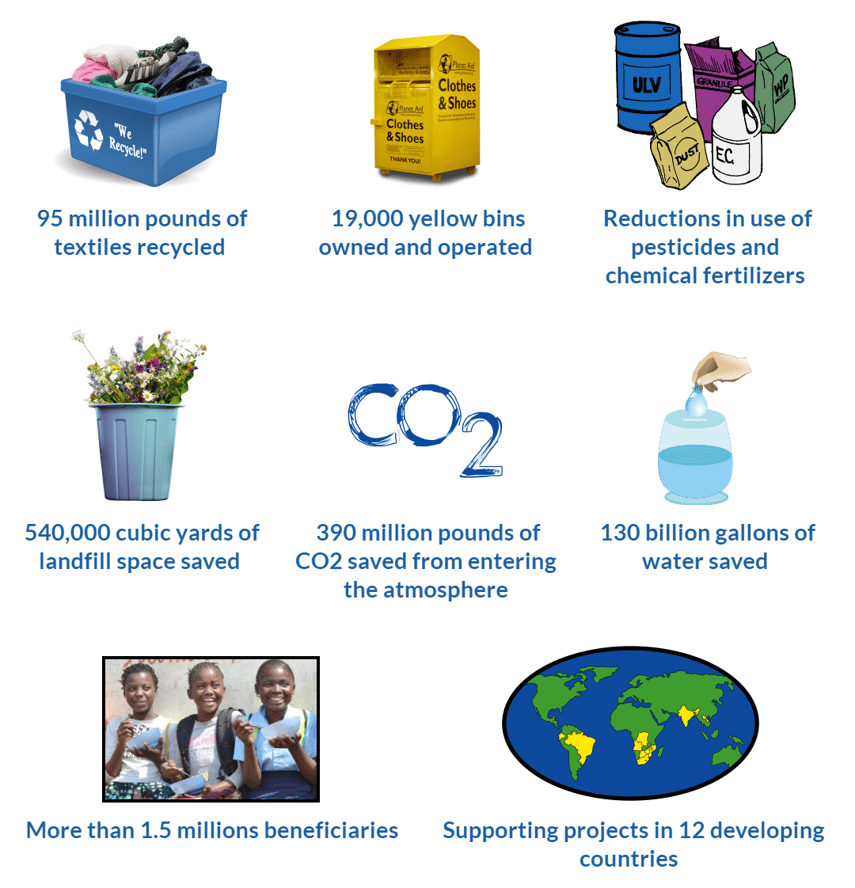
Projects
For the Environment
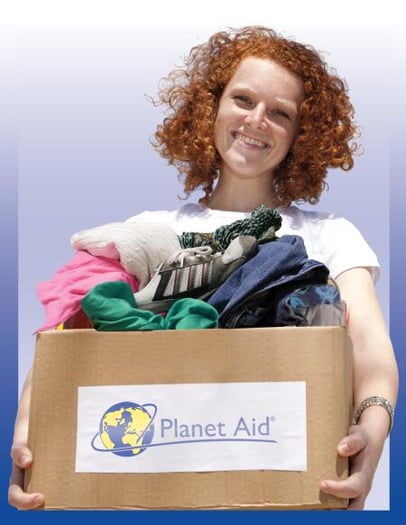 Through the reuse and recycling of this material, Planet Aid saved valuable resources that helped to reduce the emission of CO2 and other gasses that contribute to global warming. Clothing that is decaying in a landfill releases methane, a potent greenhouse gas. Similarly, producing the fibers to make cloth, such as cotton, is energy intensive and requires large inputs of fossil fuel, water, fertilizer, and pesticides. Reusing clothing and reducing the need for manufacturing new clothes is a meaningful way to save resources and mitigate climate change. In 2016, Planet Aid collected approximately 95 million pounds of used textiles and household items in the United States.
Through the reuse and recycling of this material, Planet Aid saved valuable resources that helped to reduce the emission of CO2 and other gasses that contribute to global warming. Clothing that is decaying in a landfill releases methane, a potent greenhouse gas. Similarly, producing the fibers to make cloth, such as cotton, is energy intensive and requires large inputs of fossil fuel, water, fertilizer, and pesticides. Reusing clothing and reducing the need for manufacturing new clothes is a meaningful way to save resources and mitigate climate change. In 2016, Planet Aid collected approximately 95 million pounds of used textiles and household items in the United States.
Read more about our recycling efforts.
For People
For nearly two decades, Planet Aid has been supporting development projects across the globe that are helping to fight poverty. Through the funds generated by our used clothing operation and government contracts, Planet Aid is able to provide life-changing, sustainable assistance. Below is an overview of the projects we supported in 2016.
Locations of Development Projects
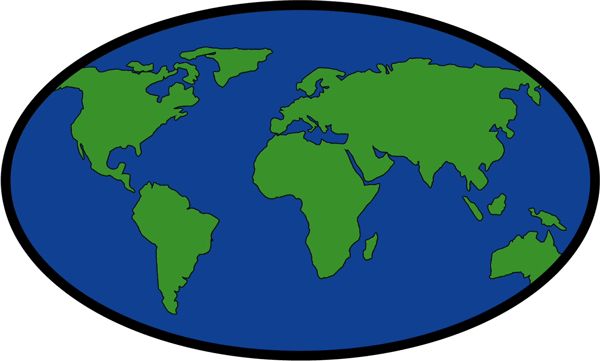
| Angola | Democratic Republic of the Congo | Malawi |
| Belize | Ecuador | Mozambique |
| Botswana | Laos | South Africa |
| Brazil | India | Zimbabwe |
Types of Projects We Support
Food and Nutrition • Education • Community Development
Sustainable Agriculture • Health
Food and Nutrition
.jpg?width=855&height=570&name=Girls_Eating%20(1).jpg)
Nutrition Projects
Countries: Malawi, Mozambique
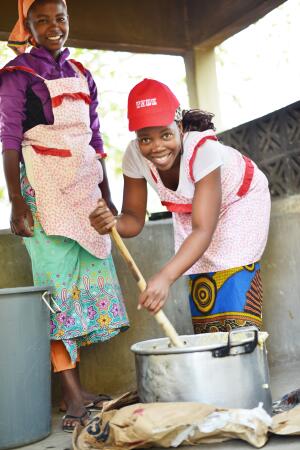 Planet Aid–supported nutrition projects in Malawi and Mozambique seek to improve nutrition through a series of targeted interventions that improve diets, hygiene, and related behaviors.
Planet Aid–supported nutrition projects in Malawi and Mozambique seek to improve nutrition through a series of targeted interventions that improve diets, hygiene, and related behaviors.
In Malawi, the “Support to Scaling Up Nutrition” project focused on reducing child stunting and maternal and child anemia in the Blantyre and Chiradzulu districts. Project staff and volunteers counseled pregnant and lactating women on proper nutrition and feeding practices and by establishing nutrition and health care groups to provide continual support. Local diets were enhanced through the distribution of more than 100,000 fruit trees and 60,000 cassava cuttings.
To reduce the impact of epidemic disease, which can greatly reduce nutritional status by undermining overall health, the project distributed more than 200,000 bed nets to reduce malaria incidence. Communities and individual households were also mobilized to establish sanitary facilities such as pit latrines and handwashing facilities. The project is also supported by the International Development Association (IDA-World Bank) and Canadian International Development Assistance (CIDA) through the Department for Nutrition, HIV & AIDS (DNHA) in Malawi.
Similarly, in Mozambique the nutrition project targeted pregnant and lactating women and teenage girls in Niassa Province and also launched a new nutrition project in the fishing communities of Zambezia Province. The latter region is also known for high HIV/AIDS prevalence and thus prevention techniques were also included in outreach activities. The project has been carried out with support from the World Bank.
Overall, the ongoing nutrition projects in Malawi and Mozambique supported by Planet Aid reached approximately 200,000 households in 2016.
Food for Knowledge Project
Countries: Mozambique
The Food for Knowledge Project is Planet Aid’s comprehensive school lunch and education initiative in Mozambique. The project is funded by the U.S. Department of Agriculture as part of the McGovern-Dole International Food for Education and Child Nutrition Program.
In addition to providing daily meals for students, the project trains primary school teachers, establishes gardens and after-school learning clubs, builds literacy skills, provides nutrition education, and helps to construct and refurbish school kitchens, water wells, and latrines.
Recently, Food for Knowledge, in partnership with Cambridge Education, developed early grade reading materials in the local languages of Changana and Ronga. The new materials will help beginning readers to more readily “decode” the meanings of words in their mother tongue, helping to overcome a key obstacle that had been hindering their ability in learning how to read (Portuguese has traditionally been used to teach students to read).
In 2016, Food for Knowledge provided a daily school lunch to approximately 80,000 children and trained approximately 1,400 teachers.
Read more about the Food for Knowledge Project.
Education
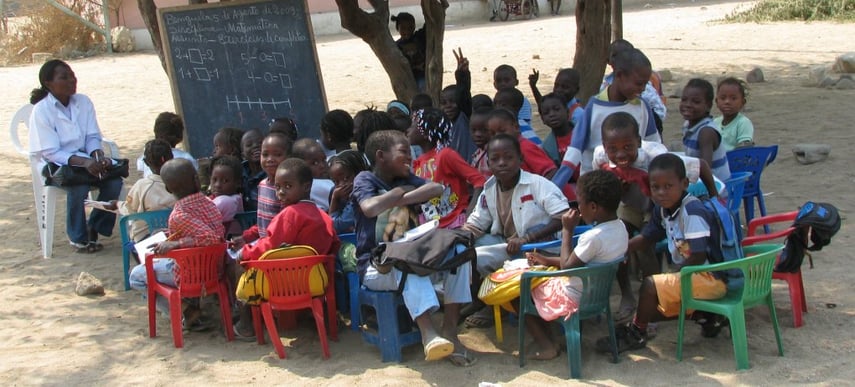
Teacher Training Projects
Countries: Angola, the Democratic Republic of the Congo, India, Malawi, Mozambique
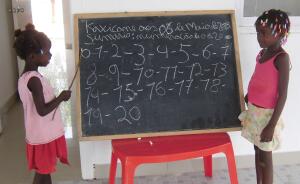 Many developing nations, suffer from a shortage of well-qualified teachers. A dearth of resources combined with overwhelming demands—such as managing a classroom with upwards of 60 students—requires teachers to be exceptionally dedicated and resourceful.
Many developing nations, suffer from a shortage of well-qualified teachers. A dearth of resources combined with overwhelming demands—such as managing a classroom with upwards of 60 students—requires teachers to be exceptionally dedicated and resourceful.
Planet Aid currently supports teacher-training colleges in five countries. The colleges equip educators with a comprehensive set of tools that enable them to make a difference in the classroom as well as the greater community in which they work. The idea is to create an exciting learning environment and encourage children, who face many pressures to drop out, to stay in school. Graduates of the teacher-training colleges are qualified to teach mathematics, reading, and other subjects, but they also learn how to mobilize communities in support of education as well as general community development. The latter is essential for children to enroll in and stay in school.
For example, in the Democratic Republic of the Congo, the school drop-out in the primary schools in the vicinity of the Planet Aid–supported Mbankana Teacher Training College decreased by more than half over a two-year period. This outcome was likely a response to the excitement generated by student teachers working in local primary schools and by campaigns in the local community focused on spreading understanding of the need for a good education.
Read more about Teacher Training.
One World University
Countries: Mozambique
One World University in Mozambique is a Planet Aid–supported institution of higher education that trains instructors for teacher training colleges and develops new leaders in the fight against poverty. Students have the option of undertaking one of two courses: Pedagogy or Community Development.
The Pedagogy course is designed to train educators who, in turn, train primary school teachers at teacher training colleges. The Community Development course shapes students into critical thinkers who can tackle development challenges on the community level.
In 2015, more than 200 students were in training at the OWU campus in Mozambique, and an additional 350 students were completing their studies through the university’s distance learning program.
Read more about One World University.
Vocational Training
Countries: Angola, Mozambique, Zimbabwe
Planet Aid–supported vocational schools provide young men and women in rural areas with the necessary skills to qualify for a job or to start their own business. Currently, Planet Aid supports vocational schools in Angola, Mozambique, and Zimbabwe. Approximately 400 students were enrolled at the vocational schools in 2016.
The courses offered range in length from three months to three years. Featured subjects include agriculture, construction, solar energy technology, mechanics, and much more. Along with classroom experience, students also offered the opportunity to obtain real-world experience by becoming an apprentice at a local business.
Read more about Vocational Training.
Early Education Initiatives
Countries: Mozambique, South Africa
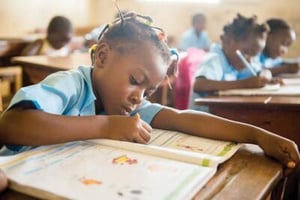 Planet Aid supports preschool initiatives that provide access to early childhood development, a key intervention for ensuring a child’s academic success.
Planet Aid supports preschool initiatives that provide access to early childhood development, a key intervention for ensuring a child’s academic success.
In Mozambique, the 70 Preschools in Maputo Project promotes the development of children under the age of six, through community-based preschool services. The project is a partnership with the Mozambique Ministry of Education and is co-funded by the World Bank. The aim is to develop and test a sustainable model for the establishment and operation of community preschools, with a view to integrate them into the basic education system in Mozambique by the year 2020.
In 2016, 70 Preschools enrolled approximately 1,400 children at 24 newly established preschools.
Another preschool initiative supported by Planet Aid is Preschools of the Future (POF) in South Africa. With an increasing need for quality, affordable preschool education for children in the nation, this program aims to provide comprehensive early childhood development services to children aged 2–5 from disadvantaged backgrounds.
The program also seeks to increase the involvement of parents and guardians in their children’s day-to-day lives in order to help pave a way for their future.
In 2016, 1,200 preschool-aged children received a preschool education through the Planet Aid–supported POF program in South Africa.
Read more about Early Education Initiatives.
Nikhalamo Girls Stay in School Project
Countries: Mozambique
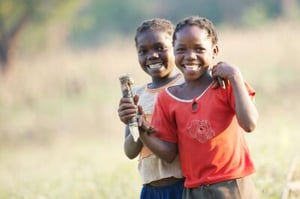 Nikhalamo in the local Mozambican language of Chuabo means “I am here to stay.” The Planet aid–supported Girls Stay in School Project has adopted this name because it aims at improving retention and completion among vulnerable girls’ in the 6th and 7th grades and increase their transition to secondary school.
Nikhalamo in the local Mozambican language of Chuabo means “I am here to stay.” The Planet aid–supported Girls Stay in School Project has adopted this name because it aims at improving retention and completion among vulnerable girls’ in the 6th and 7th grades and increase their transition to secondary school.
This project is working with 18 primary schools and 3 secondary schools in the Namacurra District of Mozambique. During 2016, Nikhalamo engaged in a wide range of activities, from providing gender-sensitivity training to teachers and school councils to constructing girl-friendly latrines.
The project also launched a community gender-sensitivity campaign, in partnership with Girl Child Rights, and developed tools and guidelines for use during facilitation of gender-norm sessions in the community. The goal of the campaign is to influence a reduction in gender-based violence. The campaign reached 1,872 individuals, including girls, boys, school council members, teachers, and community leaders. Overall, the project has helped more than 2,000 girls in 2016 alone. Nikhalamo is funded by the U.S. Agency for International Development.
Read more about the Nikhalamo Girls Stay in School Project.
Step-Up Centers
Countries: India
Planet Aid supports children across Northern India through "Step-Up Centers." These centers focus on reaching especially vulnerable children who, for a variety of economic or social reasons, have never attended school or have dropped out. The aim is to help children by providing them with “bridge education” so that they can attain the skill and knowledge levels required to re-enter or enroll for the first time in government schools.
Step-Up Centers’ curriculum consists of mathematics, science, English, and computer training, along with other curriculum requirements established by the government. There are 11 Planet Aid–supported Step-up Centers in the states of Delhi, Madhya Pradesh, and Haryana. In 2016, nearly 4,000 children were enrolled in the program.
The project has also been working in the towns of Gurgaon and Tuticorin. In 2016, 106 affiliated Academic Support Centers were established by the project in government schools or other locations, catering to nearly 9,000 children, primarily young girls. These centers are where the children receive lessons, engage in group study, and participate in other theme-based activities.
Read more about Step-Up Centers.
Ponesai Vanhu Junior School
Countries: Zimbabwe
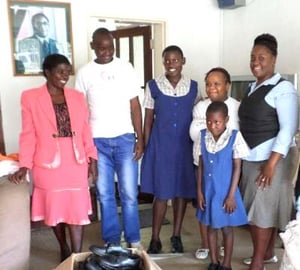 Children attending the Planet Aid–supported Ponesai Vanhu Junior School live in a supportive environment that allows them to develop life, educational, social, and vocational skills. The school serves as a rehabilitation and reintegration center for street children under the age of 18. Orphans and abandoned children from the 10 provinces of Zimbabwe attend the school.
Children attending the Planet Aid–supported Ponesai Vanhu Junior School live in a supportive environment that allows them to develop life, educational, social, and vocational skills. The school serves as a rehabilitation and reintegration center for street children under the age of 18. Orphans and abandoned children from the 10 provinces of Zimbabwe attend the school.
Ponesai provides the basics for a stable and healthy life, including shelter, food, clothing, medical attention, and psychological and academic support. During 2016, the school had 57 students living at its campus in Shamva District.
Frontline Institute
Countries: Zimbabwe
The Planet Aid–supported Frontline Institute in Zimbabwe trains individuals interested in development in how to work on the “frontline” in the fight against poverty, hunger, illiteracy, and diseases. The courses offered at the Institute equip students with project management skills as well as provide them opportunities for in-depth study of the major development challenges of our time.
Students at the Institute are chosen from among employees or participants in Humana People to People projects worldwide. The idea is to train enough activists to fulfill the current needs at the projects and to pave the way for expansion with more projects and fields of development. Frontline trains students to become political and cultural persons who act when they observe injustice and are passionate about creating development together with people in rural communities.
In 2016, over 200 students were enrolled at the Frontline Institute. Since its inception in 1993, Frontline has graduated more than 5,000 students.
Read more about the Frontline Institute.
Community Development
.jpg?width=855&height=211&name=ComDev1%20(1).jpg)
Child Aid Projects
Countries: Belize, Botswana, Brazil, the Democratic Republic of the Congo, Ecuador, Laos, Malawi, South Africa, Zimbabwe
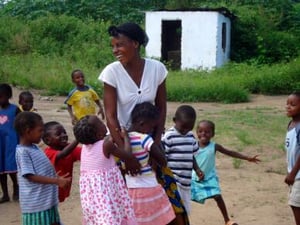 Child Aid is Planet Aid’s most established and widely used community development model. The approach mobilizes the population to address local conditions so that children have the opportunity to grow up healthy and have a chance at a better life. In 2016, approximately 40,000 families were reached by Planet Aid–supported Child Aid projects in 9 countries.
Child Aid is Planet Aid’s most established and widely used community development model. The approach mobilizes the population to address local conditions so that children have the opportunity to grow up healthy and have a chance at a better life. In 2016, approximately 40,000 families were reached by Planet Aid–supported Child Aid projects in 9 countries.
Broadly based, Child Aid builds capacity in families and their communities in an all-inclusive program. It recognizes that in order to nurture children successfully, the entire community must be strengthened. Families are organized into community action groups that address the most pressing local challenges in areas such as health and sanitation, income generation, education, and more.
For example, in South Africa a community that was part of a Child Aid project planted trees and supported tree-planting campaigns. The goal was to improve the local as well as the global environment, and to better understand the larger ramifications of local action in the context of climate change.
Sustainable Agriculture
.jpg?width=855&height=570&name=Ag_6%20(1).jpg)
Farmers' Clubs Projects
Countries: Brazil, the Democratic Republic of the Congo, Ecuador, India, South Africa, Zimbabwe
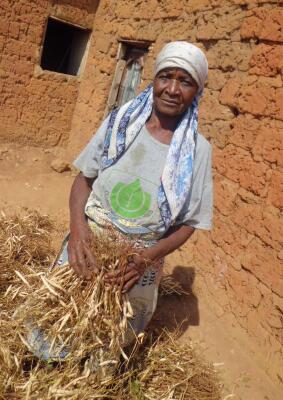 Planet Aid supports the Farmers’ Clubs program in six countries, providing the training and resources needed to assist those who depend on farming to sustain themselves and their families. In 2016, Farmers’ Clubs supported by Planet Aid assisted more than 21,000 farmers.
Planet Aid supports the Farmers’ Clubs program in six countries, providing the training and resources needed to assist those who depend on farming to sustain themselves and their families. In 2016, Farmers’ Clubs supported by Planet Aid assisted more than 21,000 farmers.
The Farmers’ Clubs development model centers on the organization of a network of “clubs,” which consist of about 50 farmers each. The club members receive training in conservation agriculture and other sustainable techniques, and work together as a unit to test the efficacy of the new methods and problem solve all along the way.
In Zimbabwe and other African countries, the production of crops in 2016 was greatly affected by a severe drought, which resulted in low and unevenly distributed rainfall. Even with the drought, farmers in Farmers’ Clubs in Zimbabwe were able to produce enough food to get them through after the harvest had ended. The training provided by the project taught them how to grow more drought-resistant crops that can withstand arid conditions.
Read more about Farmers' Clubs.
Green Action Neemrana Project
Countries: India
The Planet Aid–supported Green Action Neemrana project was established in July 2009 to expand sustainable agricultural techniques in the towns of Neemrana and Behror in the Alwar District in India. The project utilizes the Farmers’ Clubs development model and has involved the participation of farmers in nearly 70 villages. The focus is on developing the use of sustainable practices, water-saving techniques, and enhanced crop management.
Among the successes of the project has been the introduction of modern irrigation and rainwater-harvesting technology that relieves pressure on groundwater resources. Water tables drop precipitously during the dry season and the introduction and adoption of the new techniques has helped alleviate some of the impacts.
In addition, the project introduced biogas digesters (a large tank that uses organic waste to produce gas for cooking). These digesters helped relieve the need to collect firewood or make “dung cakes” (a local practice of making fuel from dried manure) to cook food. Since women are responsible for collecting fuel and cooking, the introduction of the digesters helped make their lives less burdensome.
IGreen Action has reached 16,000 farmers and their family members directly through training and demonstration gardens and an additional 29,000 farmers indirectly who participated in events organized by the project.
Read more about the Green Action Neemrana Project.
Health
.jpg?width=855&height=570&name=Health_6.2%20(1).jpg)
Total Control of the Epidemic (TCE) Projects
Countries: South Africa, Malawi, India
Developing countries have some of the highest rates of HIV/AIDS, tuberculosis, and malaria in the world. Due to the lack of available information about the diseases in these areas, many infected individuals are stigmatized and do not get the proper treatment they need, simply because they fear going to a clinic or because the treatment is not available.
The Total Control of the Epidemic (TCE) program is aimed at bringing the spread of epidemic disease in developing nations to a halt. The program mobilizes communities and individuals to change behaviors that prevent new infections from occurring. It also seeks to overcome the stigma that afflicts those who have become infected and results in their becoming ostracized and not receiving the treatment that they need.
In 2016, Planet Aid–supported TCE programs in South Africa, Malawi, and India reached more than 1 million individuals with HIV or TB prevention information, referred thousands for testing, and provided hundreds of thousands of condoms to individuals within the targeted areas.
HOPE Projects
Countries: South Africa, Botswana
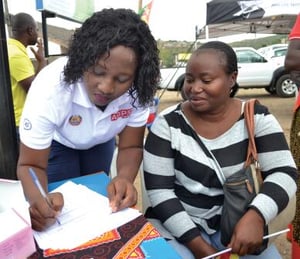 Planet Aid supports the HOPE project in Botswana and South Africa. As the name implies, HOPE is a project that aims to inspire those who are afflicted with disease and support them in finding the strength to carry on.
Planet Aid supports the HOPE project in Botswana and South Africa. As the name implies, HOPE is a project that aims to inspire those who are afflicted with disease and support them in finding the strength to carry on.
HOPE establishes community facilities that serve local populations affected by HIV/AIDs or tuberculosis. The centers provide counseling and testing, organize prevention and other outreach activities in the community, offer care and treatment support for people living with HIV/AIDS, and much more.
In Botswana, HOPE added mobile HIV/AIDS testing to its services, which means it enabled people to receive testing in the privacy of their home. Too often, people in rural areas are reluctant to come into a clinic to find out their HIV status because it is too far or they fear entering such a facility. The mobile testing component has been highly successful and has contributed to nearly 3,000 individuals tested in 2016.
Overall, in 2016, HOPE centers in South Africa and Botswana reached more than 200,000 individuals.
Distribution of Support by Sector
.png?width=1200&height=404&name=Project_Pie_Chart.1%20(1).png)
Planet Aid at Home
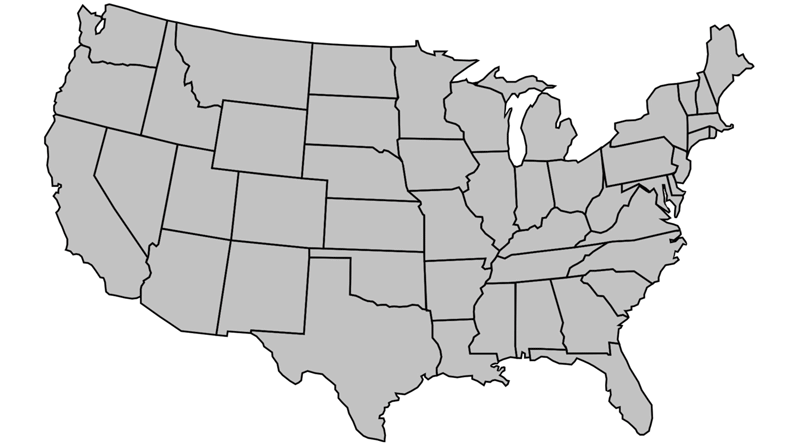
Through the collection and recycling of used clothing, Planet Aid saves valuable resources that help reduce the emission of CO2 and other gasses that contribute to global warming. Clothing that is decaying in a landfill releases methane, a potent greenhouse gas. Similarly, producing the fibers to make clothing fibers, such as cotton, is energy intensive and requires large inputs of fossil fuel, water, fertilizer, and pesticides. Reusing clothing and reducing the need for manufacturing new clothes is an easy way to save resources and mitigate climate change.
Planet Aid collected and recycled nearly 100 million pounds of clothes and shoes in the United States in 2016. We also did a lot more too. Here are a few highlights from 2016.
Planet Aid Taps into the Sun
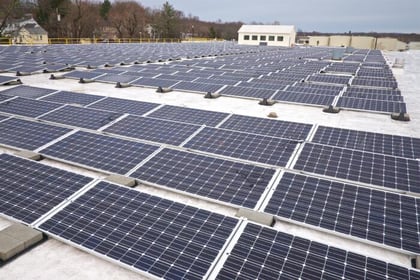 In November 2016, Planet Aid began installation on a large-scale solar energy rooftop system at the warehouse facility in Milford, Massachusetts. When completed, the system will produce 684,000 kilowatt-hours per year, meeting Planet Aid’s energy demands and producing a surplus for others to use. The array will contribute to Massachusetts achieving its goal to cut greenhouse gas emissions to 15% of 1990 levels by 2020. Approximately 12,000 metric tons of carbon dioxide will be saved, which is equivalent to saving over 1.3 million gallons of gasoline or planting more than 11,000 acres of new forest. Read more
In November 2016, Planet Aid began installation on a large-scale solar energy rooftop system at the warehouse facility in Milford, Massachusetts. When completed, the system will produce 684,000 kilowatt-hours per year, meeting Planet Aid’s energy demands and producing a surplus for others to use. The array will contribute to Massachusetts achieving its goal to cut greenhouse gas emissions to 15% of 1990 levels by 2020. Approximately 12,000 metric tons of carbon dioxide will be saved, which is equivalent to saving over 1.3 million gallons of gasoline or planting more than 11,000 acres of new forest. Read more
Planet Aid Receives Recycling Award
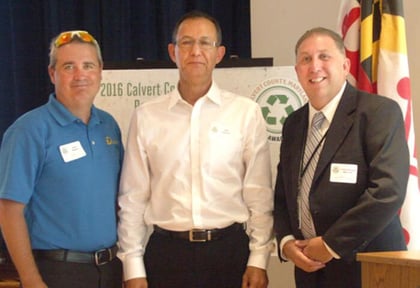
Planet Aid earned first place in the 2016 Calvert County Recycling Awards. Planet Aid was recognized as the leading organization in the “Recycling Industry Category.” The award was presented to Planet Aid by Calvert County Commissioner Mike Hart.
"You have probably seen those yellow metal bins near parking lots. They are quietly doing a lot of recycling, "said Commissioner Hart. "Sixteen bins helped recycle close to 50,000 pounds of textiles in Calvert County last year. That’s a 50 percent increase from 2014."…read more
Planet Aid Featured in Exhibit at Skirball Cultural Center
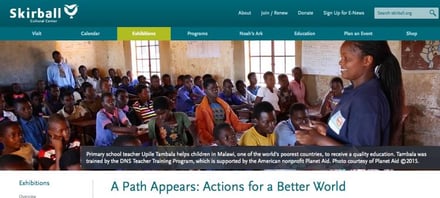
Last year, the Skirball Cultural Center in Los Angeles, California launched the interactive exhibition: “A Path Appears: Actions For A Better World.” Planet Aid was featured in the gallery area featuring exhibits of innovative educational projects from around the globe serving populations ranging from runaways to young child in developing countries. A large display features Upile…read more
Planet Aid Donation Drives Held Across the Country
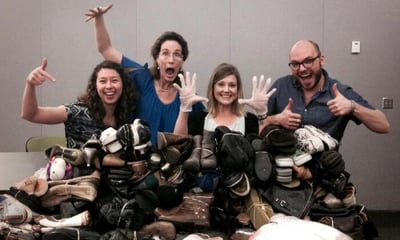
In 2016, Planet Aid helped divert thousands of pounds of textiles from landfills through donation drives. We partnered with companies, school districts, shelters, and other organizations across the country to organize these drives. In the process, we also helped raise awareness of the need to recycle textiles.
Visit our local Planet Aid pages to learn more about the drives held in 2016. Read more
Planet Aid Supports Care of Poor People
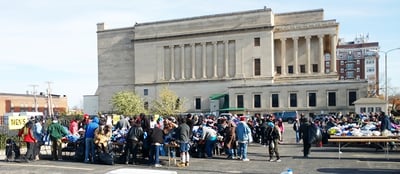
Last Thanksgiving, Planet Aid donated thousands of pounds of clothes, coats, and blankets to Care of Poor People’s annual Fall Survival Event. The event is an opportunity for individuals in need and area homeless to get hot food, personal hygiene products, and clothes for the upcoming winter. Planet Aid is a long-time supporter of COPP and remains committed to its mission and other area homeless…read more
People at Planet Aid
Board and Officers
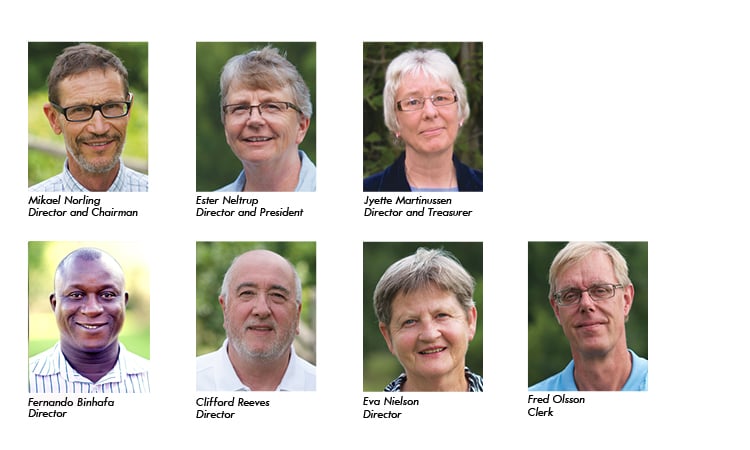
Meet Our Staff...
 Rodolphe “Rudy” Chavannes is a warehouse employee at Planet Aid’s Elkridge, Maryland location. He’s spent his six-year tenure with Planet Aid doing just about everything in the warehouse, as well as traveling to and working at the Hatboro, Pennsylvania and Charlotte, North Carolina locations. “I enjoy the traveling part,” he said. “That combined with the physical labor, I love it.”
Rodolphe “Rudy” Chavannes is a warehouse employee at Planet Aid’s Elkridge, Maryland location. He’s spent his six-year tenure with Planet Aid doing just about everything in the warehouse, as well as traveling to and working at the Hatboro, Pennsylvania and Charlotte, North Carolina locations. “I enjoy the traveling part,” he said. “That combined with the physical labor, I love it.”
After waiting 10 years, Rudy received a United States visa in 2000. “I grew up in Haiti and wanted to come to the States for the better opportunities available here,” he said. “Since I came from a developing country, I know what it’s like to be less fortunate. Working for Planet Aid allows me to help others in developing countries have better opportunities. I know my work is not in vain.”
Rudy was introduced to Planet Aid by his cousin and has cottoned to the agile and familial environment. “My job is not monotonous,” he said. “It’s also been wonderful to be able to cultivate relationships with other Planet Aid employees.”

Abdi Erazouki began work with Planet Aid in June of 2009 working with businesses and organizations in hosting Planet Aid bins. He is now the territory manager for Washington, DC and Virginia, and is responsible for all bins within that area. Though territory manager is the official title, Abdi says he’s more of a “relationship manager.” “The relationships with the owners of the sites are the most important part,” he said.
The other important part of Abdi’s position is connecting with the community. He interacts with the area’s public schools, chambers of commerce, legislators, and charities to help spread the word about Planet Aid’s work. “I find my position very fruitful because I believe in Planet Aid’s mission,” he said. “It’s a perfect fit for me. When I get up in the morning I have a goal to help people and working at Planet Aid means I know I helped someone.”
In 2013 Abdi had the chance to go to Malawi, Mozambique, and Zimbabwe and see the work Planet Aid is implementing. “It was an amazing eye-opener,” he said. Now Abdi feels that when he speaks with potential sites owners about Planet Aid, its mission, and its work, he knows how it impacts people across the globe. “The trip helped educate me,” he said, “and now I can better explain why it is my mission, and should also be the site owner’s mission, to make a better life for others.”
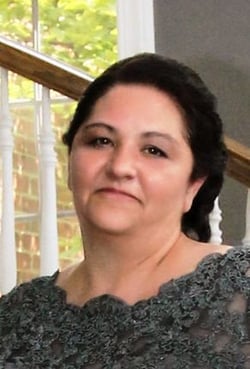
Kim Lipfird is the Administrative Assistant at Planet Aid’s Ohio location. She’s been with Planet Aid for over ten years, and her title hardly reflects the full scope of what she does today. Kim, who was out getting new hoses for a warehouse forklift at the time, said, “I do anything that needs to be done, and I really enjoy the diversity of tasks.”
Kim joined Planet Aid because of the community-focused work and what Planet Aid stands for; she’s stayed for the camaraderie and family-like atmosphere. “It’s always all hands on deck,” she said. “It’s all about the teamwork.” Kim is also passionate about Planet Aid’s overseas programs. “I like helping people and hearing the stories of how we have impacted their lives.”
About three years ago, Kim initiated a partnership with the Ohio prison system to help provide shoes and clothing for prisoners being released. That program has now expanded to a work-training program where the inmates volunteer to work on Planet Aid collection bins. After a lot of time and energy, countless meetings, and getting all the necessary approvals, Kim and her team, and a handful of dedicated prisoners, have made this a strong and viable program. “I’ve been to the prison multiple times and worked with a lot of the inmates,” she said. “I’m very proud of the program.”

Beth Sheehy has been a consultant with Planet Aid for over 10 years. As a senior representative to the U.S. Government, she helps find support for Planet Aid’s development initiatives overseas.
Beth began her career in international development as a Peace Corps volunteer in Kazakhstan. “I started working on global health and food aid programs,” she said, “and that’s what I continue to do today with Planet Aid. The organization has a unique model of delivering foreign assistance, with cost-effective and responsible programming and an emphasis on the beneficiary. I feel lucky to be a part of the team.”
Beth was instrumental in developing Planet Aid’s highly successful Food for Knowledge program in Mozambique. “It’s wonderful to have the program funded and to see how it has grown over the years,” she said. “We’re now feeding over 80,000 children and started a new literacy intervention component that is a global model. It’s incredible progress.”
While the work has been gratifying, Beth is ready for the next challenge. “We’re currently facing a reduction in funding for foreign assistance,” she said. “We have to work hard to advocate the importance of foreign aid and reach out to a greater expanse of people. However, I believe that foreign assistance represents the best of the American spirit, compassion, and generosity.”
In addition to her work in international development, Beth is also a real estate agent in the DC area. “I feel fortunate to have two professional passions,” she said.
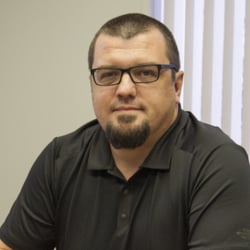
Chris Thompson has been a member of the Planet Aid family for eight years. He was originally the Operations Manager at our Michigan location and then took the Transportation Manager position, working to ensure the smooth collection of donations. Chris oversees eight employees including collection drivers, a warehouse manager, a receiver, and a bin maintenance employee.
Along with managing others, Chris is responsible for determining how often bin sites need to be serviced and when, and making adjustments to the routes and schedules. “Every day is different,” Chris said. “I deal with whatever crops up during the day and it’s never the same.”
Before taking a position with Planet Aid, Chris worked in the automotive industry but wanted to be more green conscious. He was attracted to Planet Aid because of its recycling efforts. “It was a great way of putting my thoughts into action,” he said. When Chris learned details about Planet Aid’s mission and its programs overseas, he was even more excited to be a part of the team. “It was the icing on the cake,” he said.
A couple of years ago Chris got to see some of the benefits of his work. “In Detroit we have harsh winters,” he said, “and there are a lot of people in need.” Chris and his team took part in a coat drive for a shelter in downtown Detroit. “We wanted to help, but didn’t feel like we had gathered enough,” he said. “When we dropped off the coats though, it was amazing to see the faces of the people we were helping. They were so grateful and our contribution went much further than we thought it would.”
Financial Statement
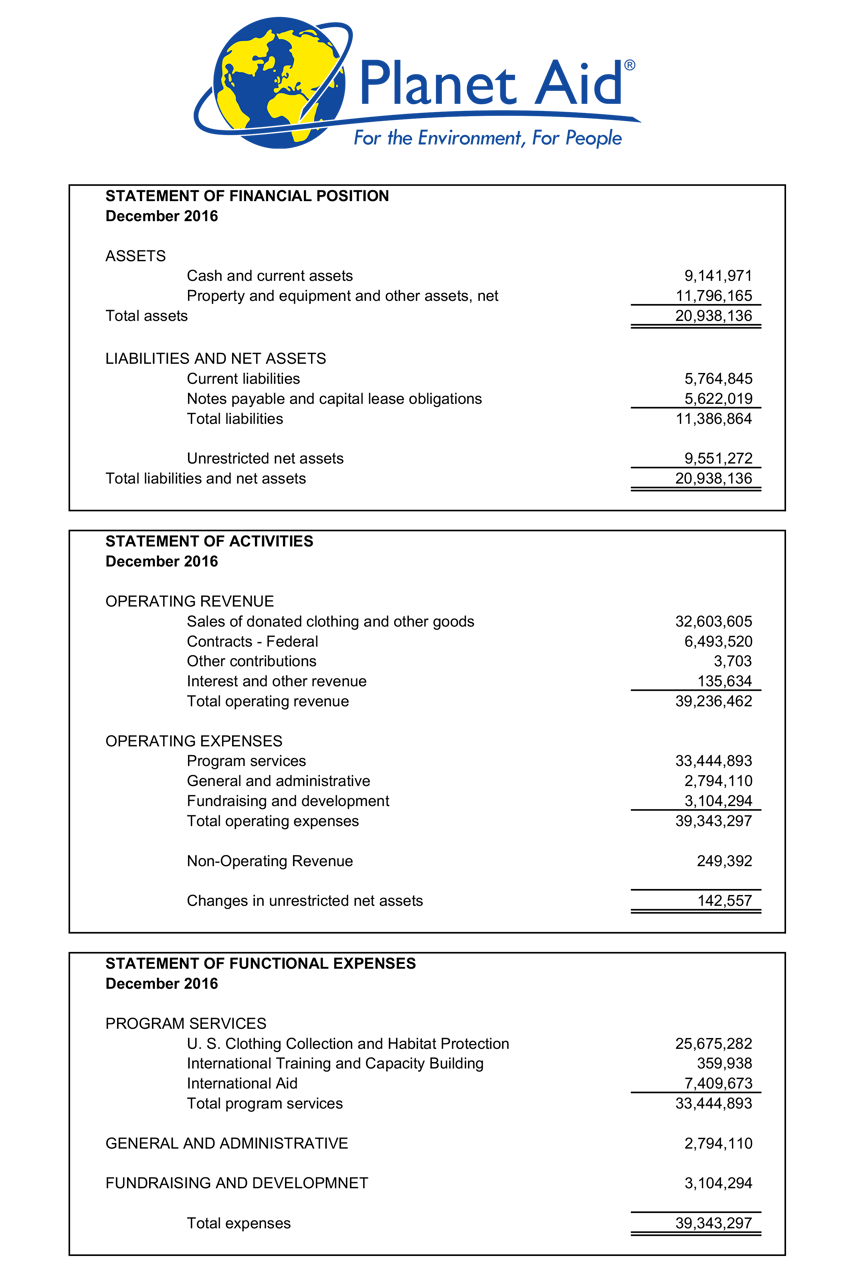
Allocation of Funds
